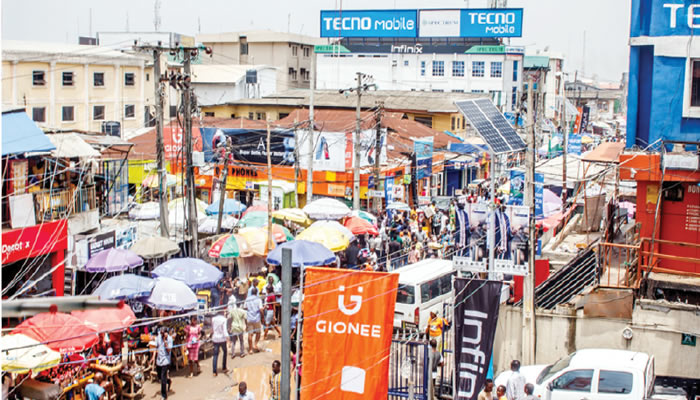In a groundbreaking decision that has sent shockwaves through Nigeria’s tech community, Lagos State authorities have recently announced plans to convert Ikeja Computer Village, the bustling hub of technology and innovation, into a residential area. This bold move, spearheaded by the Lagos State Government, is poised to reshape the landscape of one of Africa’s largest and most vibrant technology markets.
The decision to transform Ikeja Computer Village from a commercial and tech-centric space into a residential area reflects the government’s commitment to addressing the evolving needs of its growing population. Lagos, often dubbed the economic heartbeat of Nigeria, is no stranger to urban development challenges. The move signals a shift in urban planning strategies, emphasizing the need for a balanced approach that caters to the diverse needs of its residents.
As the news broke, reactions from various stakeholders flooded social media platforms, with tech enthusiasts expressing concern over the potential impact on the thriving tech ecosystem that has flourished in Ikeja Computer Village over the years. However, proponents of the decision argue that it aligns with a broader vision for the city’s development, one that prioritizes a well-rounded urban environment.

**Understanding the Decision: A Holistic Approach to Urban Development**
The decision to convert Ikeja Computer Village into a residential area is rooted in the government’s commitment to creating sustainable, livable spaces for its residents. The city’s population has been steadily increasing, leading to challenges such as traffic congestion, inadequate housing, and a strain on existing infrastructure. The move to repurpose the tech hub is part of a larger plan to address these challenges and build a city that is both technologically advanced and socially sustainable.
By transforming Ikeja Computer Village into a residential area, the government aims to integrate the tech hub into the broader urban fabric, fostering a sense of community and inclusivity. The plan includes provisions for modern, well-planned residential developments that cater to the needs of the growing population. This holistic approach to urban development seeks to strike a balance between commercial activities and residential living, creating a more harmonious and sustainable city.
**The Impact on the Tech Ecosystem**
Ikeja Computer Village has long been a symbol of Nigeria’s technological prowess, serving as a hub for the sale and repair of electronic devices, software development, and other tech-related activities. The decision to repurpose the area has understandably raised concerns within the tech community about the potential disruption to businesses and the vibrant ecosystem that has flourished in the precinct.
However, proponents argue that the move does not signify a departure from supporting the tech industry. Instead, it signals a strategic shift in how the government plans to nurture and integrate technology into the broader urban landscape. The new vision for Ikeja Computer Village includes designated tech zones within the residential area, ensuring that the spirit of innovation continues to thrive alongside the planned residential developments.
This integrated approach seeks to create a dynamic urban environment where residents can live, work, and engage with technology seamlessly. By blending residential living with technology hubs, the government aims to create a unique urban experience that reflects the evolving needs and aspirations of Lagos’ diverse population.
**Community Engagement and Stakeholder Collaboration**
As the transformation plan unfolds, the importance of community engagement and collaboration with stakeholders cannot be overstated. The success of such a transformative project hinges on the involvement and support of those directly affected, including businesses, residents, and the broader tech community.
The Lagos State Government has expressed its commitment to a consultative process, ensuring that the voices of stakeholders are heard and considered in the decision-making process. Town hall meetings, surveys, and open forums are planned to gather feedback and insights from those who call Ikeja Computer Village home, whether as business owners or residents.
Stakeholder collaboration will be crucial in mitigating potential challenges and ensuring a smooth transition. By fostering an inclusive approach to urban development, the government aims to build consensus and create a shared vision for the future of Ikeja Computer Village.
**Conclusion: A Vision for a Modern, Inclusive Lagos**
As Lagos embarks on the ambitious journey to convert Ikeja Computer Village into a residential area, it is evident that the decision is driven by a vision for a modern, inclusive, and sustainable city. The government’s commitment to addressing urban challenges while nurturing the tech industry underscores the need for a balanced approach to urban development.
The success of this transformation will depend on effective community engagement, transparent communication, and collaborative efforts between the government and stakeholders. Ikeja Computer Village’s evolution from a tech-centric hub to a blended residential and technology zone has the potential to set a precedent for innovative urban planning in Nigeria and beyond.
As Lagos navigates this transformative process, the world will be watching to see how the city adapts to the changing needs of its residents and continues to position itself as a dynamic hub for both technology and urban living.
Support InfoStride News' Credible Journalism: Only credible journalism can guarantee a fair, accountable and transparent society, including democracy and government. It involves a lot of efforts and money. We need your support. Click here to Donate
